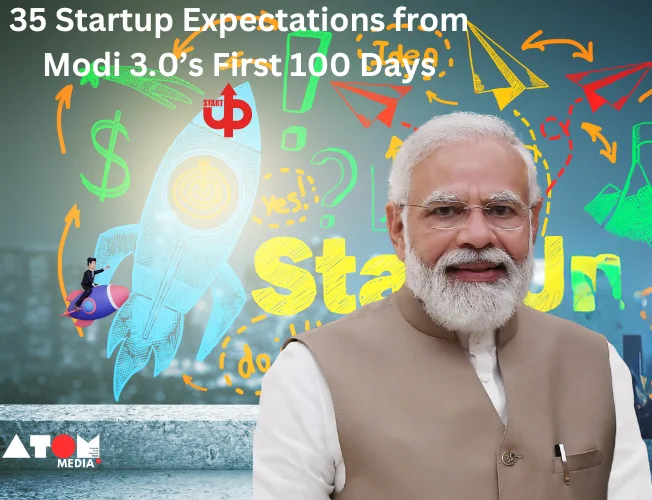With the beginning of Prime Minister Narendra Modi’s third term, the Indian startup community is looking forward to big announcements and actions that will address their long-standing issues. Here is the wishlist of Indian businesses from the first 100 days of the Modi 3.0 government, based on our talks with founders and investors prior to the interim budget earlier this year and around the outcomes of the general election.
Repeal of Angel Tax
Startups have always struggled with the issue of angel tax. The former CFO of Infosys and partner at Aarin Capital, T.V. Mohandas Pai, stressed how important it is that the Modi government get rid of this tax. Though they introduced it first, the opposition included its revocation in their manifesto.
Effective Deployment of ISM Incentive Package
A $9 billion incentive package worth INR 76,000 Cr was unveiled by the government for the Indian Semiconductor Mission (ISM). Startups are hoping that this would be implemented efficiently and without causing obstacles. Semiconductor and ESDM startups might greatly benefit from a special seed or startup fund made from this allocation.
Increased Transparency in VC Fund Agreements
Investors and founders think SEBI may increase the transparency of business agreements in venture capital organisations. These agreements frequently result in disputes that affect LP investments and the portfolio.
Self-Regulation in AI Development
Instead than waiting for regulations, which might take months to establish, startups should practise responsible AI development and self-regulation, according to Tanuj Bhojwani, CEO of People+AI.
Less Coercive Regulatory Agencies
The founder and CEO of SatNav Technologies, Amit Prasad, has advocated for less coercion from regulatory bodies. He supported light penalties and no long-term consequences for small, transient mistakes in TDS, PF, ESI, and GST payments.
Implementing GDPR-Like Standards
The small text seen in the GDPR in Europe is absent from the DPDP Act, 2023. The creator of the fintech company Niro, Aditya Kumar, emphasised the necessity of tools and knowledge for efficient compliance management.
Continued Support for the EV Sector
The G20 delegate for India, Amitabh Kant, stated that until 2030, the government will need to support the EV industry. It is crucial to extend FAME-III’s subsidies and incentives, with an emphasis on charging infrastructure and public transit.
Boosting EV Manufacturing Collaboration
An investor with a focus on mobility made the observation that encouraging a cooperative manufacturing environment for essential components would reduce beginning capital requirements and accelerate ecosystem expansion.
Reduced GST on EV Products
In order to draw investments and hasten adoption, Chargeup’s CEO and co-founder, Varun Goenka, recommended lowering the GST on EV goods and adding EV, battery development, and charging networks to the priority sector loan list.
Regulatory Support for Urban Air Mobility
DroneAcharya’s creator and managing director, Prateek Srivastava, underlined the necessity of regulatory assistance for drone companies in urban air transportation, including working with infrastructure development and urban planning agencies.
Support for MSMEs
MSMEs would gain from initiatives to encourage ecommerce among them, including tax breaks, streamlined regulations, and the development of digital payment and logistics infrastructure. These initiatives would also enable MSMEs to expand into new markets and modernise their technology and digital solutions.
Tax Incentives for Startups
Tax advantages, such as exemptions and deductions, would relieve financial burdens and promote development and innovation in the startup sector.
Simplified Compliance Procedures
Startups might concentrate more on creativity and less on administrative obstacles if compliance procedures were streamlined and bureaucratic red tape was reduced.
Improved Access to Funding
More funding options, such as low-interest loans and grants from the government, would give entrepreneurs the money they need to expand.
Incentives for Research and Development
Encouraging startups to invest in new technologies and breakthroughs could be achieved by providing incentives for research and development efforts.
Enhanced Digital Infrastructure
The expansion of tech firms depends on the improvement of digital infrastructure, which includes dependable communication networks and high-speed internet.
Support for Women Entrepreneurs
Gender diversity in the startup ecosystem would be enhanced via programmes and mentorship opportunities that empower women entrepreneurs.
Encouraging Sustainable Practices
Incentives for eco-friendly product development and sustainable business practices would encourage environmental preservation and draw in socially concerned investors.
Market Access and Export Promotion
Startups could reach a wider global audience by facilitating market access and encouraging exports through trade agreements and support programmes.
Public-Private Partnerships
Promoting public-private collaborations for innovation and infrastructure development would combine the advantages of both industries.
Strengthening IP Protection
Improving the legal framework for intellectual property would protect inventions and provide entrepreneurs the confidence to finance novel concepts.
Encouraging Industry-Academia Collaboration
Encouraging corporate and academic collaboration would help close the innovation gap by bridging the gap between research and market implementation.
Creating Startup Hubs
A conducive atmosphere for the growth of startups would be created in large cities by the establishment of innovation clusters and startup hubs.
Mentorship and Networking Programs
By putting in place networking and mentoring programmes, startups would be able to get in touch with seasoned business owners and industry professionals who could offer invaluable advice and assistance.
Read more: Marketing News, Advertising News, PR and Finance News, Digital News





